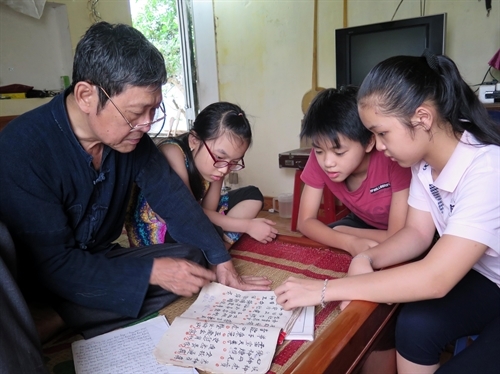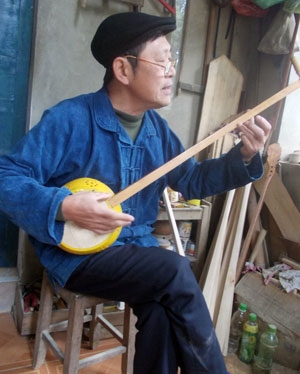 Life & Style
Life & Style

Charming then singing tunes, a traditional kind of oratorio art in Việt Nam, together with the melodious sounds of the gourd lute immediately impress visitors on arriving at Minh Xuân Precinct, Tuyên Quang City in the northern province of Tuyên Quang.
 |
| Teacher: Thàm Ngọc Kiến teaches ancient then tunes to local ethnic students at his house to preserve his ancestors’ traditional art form. — Photo dantocmiennui.vn |
TUYÊN QUANG — Charming then singing tunes, a traditional kind of oratorio art in Việt Nam, together with the melodious sounds of the gourd lute immediately impress visitors on arriving at Minh Xuân Precinct, Tuyên Quang City in the northern province of Tuyên Quang.
The tunes come from Thàm Ngọc Kiến’s musical class which offers free then singing lessons to ethnic children within the precinct.
As a member of the Nùng ethnic minority, the 62-year-old then artisan has been consistently passionate about his ancestors’ traditional art form and spent many years trying to preserve ancient then tunes.
“Then singing, which is the combination of singing, music and dance, is popular in the northern mountainous provinces of Cao Bằng, Bắc Kạn, Lạng Sơn and Hà Giang. It is normally performed at village festivals or on special occasions like the New Year festival, a wedding or a ceremony to expel evil,” Kiến says.
“To ethnic minorities, especially Tày and Nùng, then tunes are also their lullabies, melodies of their hearts and indispensable food for their spirits.”
Kiến recalls he fell for then singing as a small boy, when he often listened and sang along with the performances of his ancestors and sorcerers in the village. By the age of 10, he had memorised many then songs and was capable of playing the gourd lute fluently.
After years performing in the musical troupes of Hà Giang and Tuyên Quang provinces before retiring in 2008, Kiến has participated in many then festivals and won numerous national and provincial awards, like the silver medals in the national professional musical festival in 1990 and 1999 in Hà Nội or most recently, second prizes in five national then singing festivals in 2005, 2007, 2009, 2012 and 2015.
 |
| Artisan: Thàm Ngọc Kiến performs a then song with his gourd lute. — Photo baotuyenquang.com.vn |
Kiến says then singing has various tunes, most of which are closely associated with the spiritual life of the ethnic people. Their contents are praise of the Party, President Hồ Chí Minh, traditional customs and couples’ love of the ethnic people.
He also adds that an indispensable instrument of then singing is the đàn tính, so-called tính tẩu in Vietnamese or gourd lute in English.
“Then singing is the gift that Nùng people have been endowed with, but without a gourd lute, it is like spring without peach flowers blooming.”
As an orally-transferred art, then singing is facing the risk of falling into oblivion. Kiến’s mind is therefore always occupied with how to preserve and pass on his passion to younger generations of ethnic people.
Besides regularly participating in provincial traditional music events, he has taught then singing at his house and many arts clubs. Since 2008, over 300 then singers of various ages have been taught by Kiến, which have significantly promoted the art form within the Nùng community.
Kiến has also made hundreds of gourd lutes, which have been purchased by many people in Tuyên Quang Province and the surrounding vicinity.
According to Âu Thị Mai, the vice director of Tuyên Quang Province’s Department of Culture, Sports and Tourism, the province is home to 22 ethnic minorities with different customs and unique cultures that are, however, fading out due to a variety of reasons.
Therefore, that artisan Kiên has spent years silently collecting and preserving traditional then tunes and enthusiastically teaching young generations in singing then is highly respected, she says. — VNS




